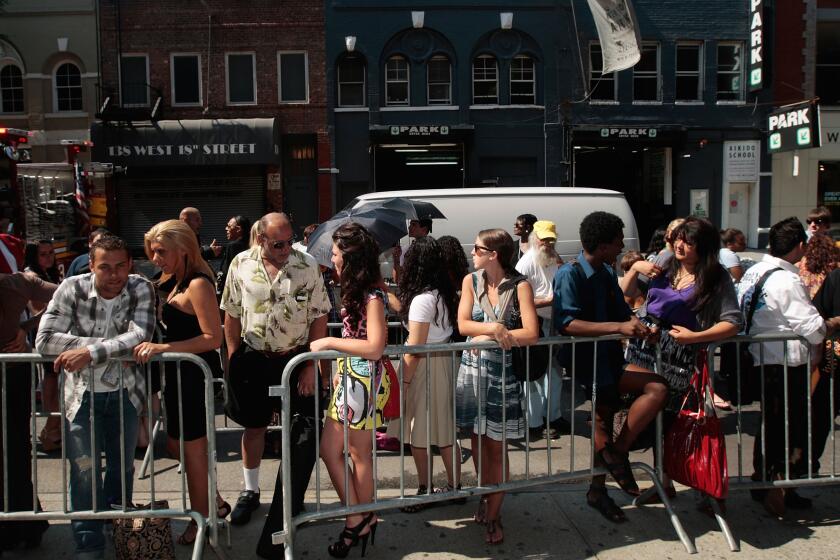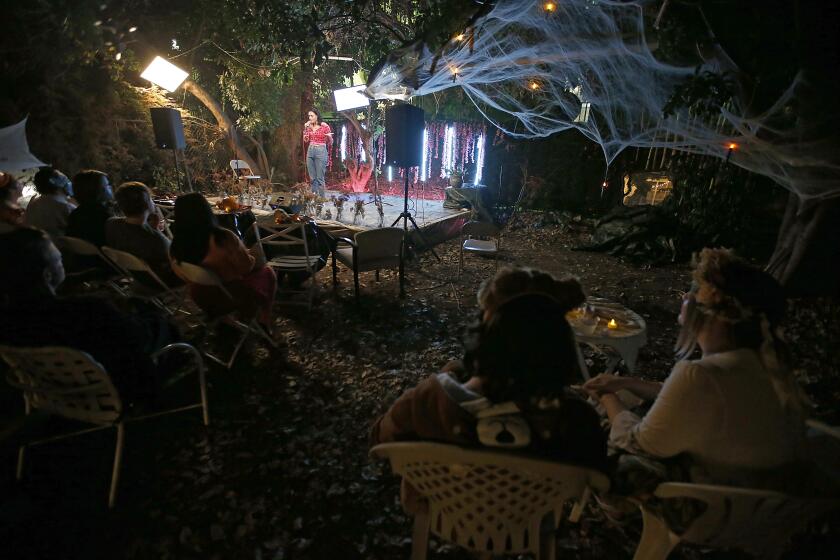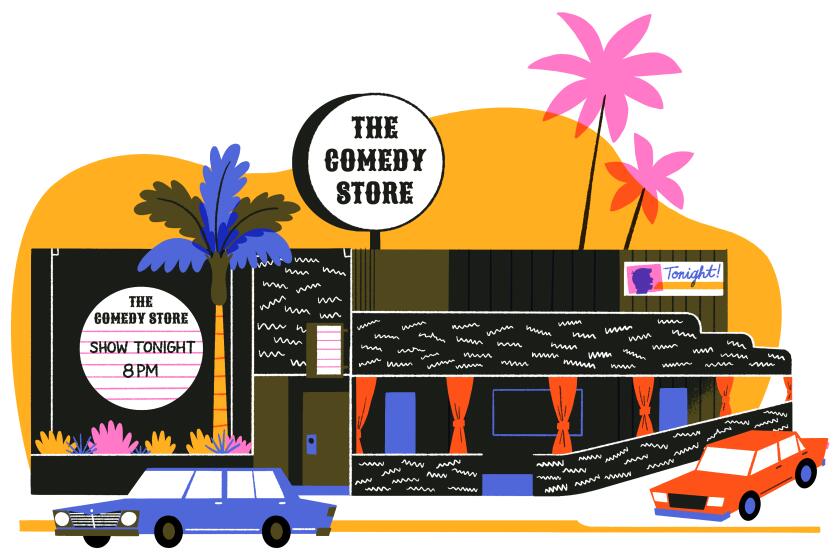Commentary: How do comedians in L.A. make a living?
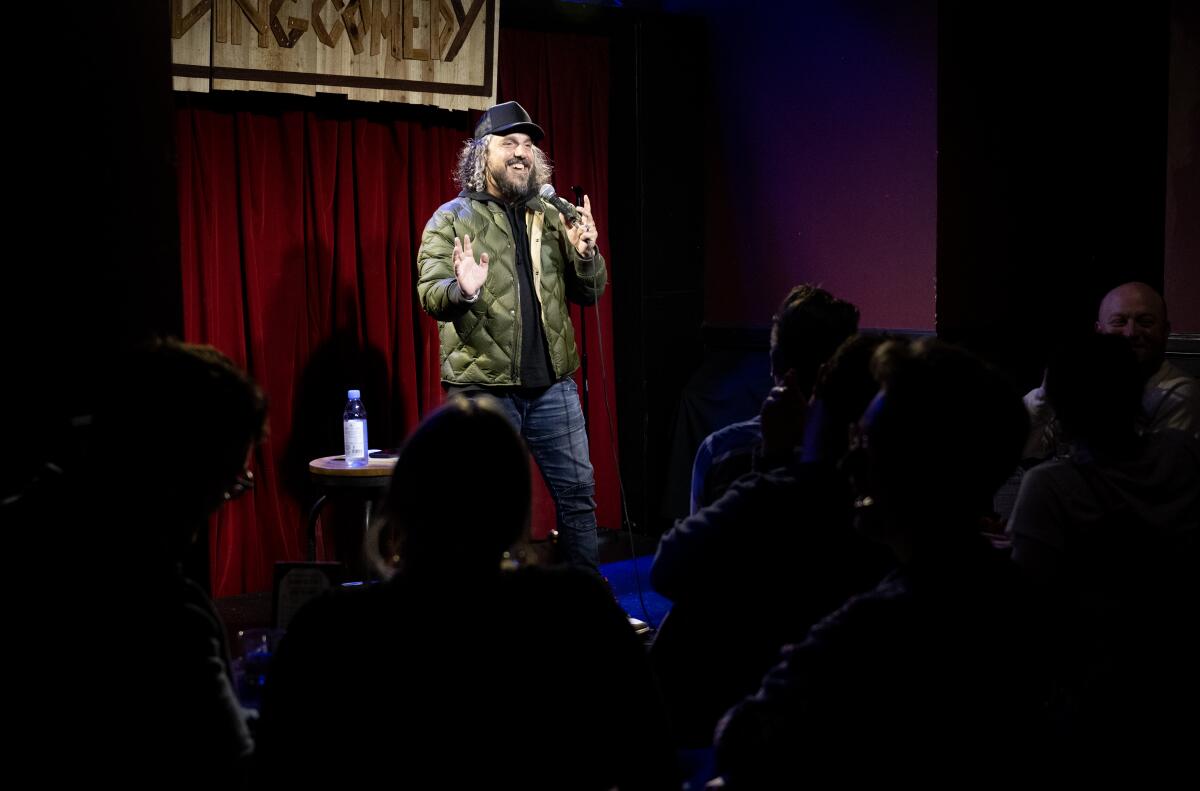
- Share via
It’s not uncommon for comedians to go from performing a tight 10 minutes of stand-up for thousands of people in a gorgeous amphitheater to juggling a handful of soul-draining gigs that have nothing to do with their craft (other than possibly being a source for future material). But the process of actually making a living performing comedy is still very mysterious, compared with most forms of performing arts (largely due to how many people will do it for free).
Megan Koester has been grinding in the L.A. comedy scene for several years — “I absolutely do not make a living doing comedy,” she said. “Occasionally I’ll get paid for a college gig, or a part in a SAG ultra-low budget production, but you couldn’t even buy a 2001 Toyota Tercel with the amount of money I generate yearly from comedy.”
As an opener at a sold-out headliner show on the road, comedian Derrick C. Brown says he brings in about $500 per show. “If I’m headlining or featuring around L.A., the pay is usually $20,” he said. Stand-up comedians, improvisers and clowns alike are subject to such fluctuations in pay. Thankfully, Brown just landed a deal to record his first comedy album with Sub Pop imprint label Pretty Good Friends after an entire decade of performing as a poet/comedian hybrid.
Yes, there are top-tier touring multimillionaire comedians like Kevin Hart, Dave Chappelle, Jerry Seinfeld or Jim Gaffigan who are the exceptions. Hart’s 2019 docuseries “Don’t F— This Up” gives an exhaustive look into the comic’s massive media empire and just how insanely busy he is to be near the top of Forbes’ annual list of richest comedians. Meanwhile, most comedians you see on a given night in the comedy hubs of L.A. and New York are barely getting paid, if at all.
So aside from the elite, how does one make a living as a comedian?
The question has persisted for decades, especially after the boom of ‘80s comedy clubs crashed, but is even more dire emerging from COVID-19. In the midst of the WGA writers’ strike — which has put a pause on income that many comedians make as writers on scripted TV shows, films and late-night — the lack of income afforded by their passion is even more depressing.
Making ends meet is one of the biggest hills to overcome in comedy, specifically, the prospect of having to sacrifice creative energy versus financial stability, or vice versa.
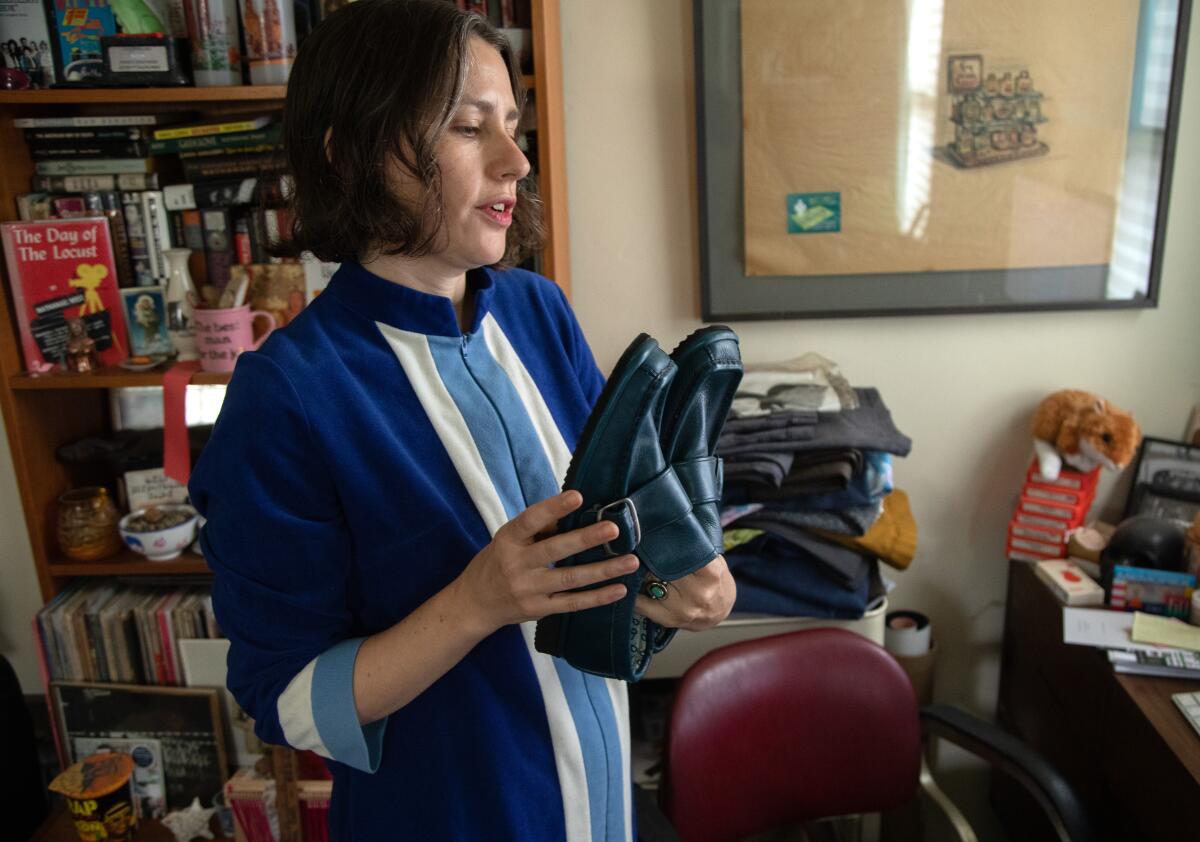
“When you have three jobs and crippling debt, you literally can’t afford to stay up until 3 a.m. every night pretending to respect an agent,” Koester said. The working comedian has gotten critical acclaim for her debut comedy album “Tertium Non Datur” on comedy record label ASpecialThing Records, and yet has to make most of her money outside of stand-up . “I mostly sell trash I acquire for free on eBay. I’m a garbagewoman,” she said. The pittances available to comedians like Koester, who aren’t acutely famous or gaining a big following on TikTok or Instagram, don’t really constitute a living wage either.
Megan experienced that firsthand when producing content during the pandemic for a major media conglomerate. “When a multimillion-dollar network pays me a flat rate of $3,000 to create something that will air on cable, be placed on a major streaming platform and never generate residuals? Honey, that’s exploitation,” she said. Koester said she made more money from pandemic unemployment benefits than actually creating a one-off TV project for a major network. She isn’t a card-carrying member of the WGA, but has been on the picket line as part of SAG-AFTRA. “There’s no goddamned reason why I, or anyone, should accept or even be offered a lower day rate to work on something produced by Disney+, because the first word in Disney+ is ... Disney. I’m praying for an industry-wide strike, and not only because I love free Clif Bars.”
Since the profit margins are thin at the lower rungs of comedy, taking on multiple gigs is a necessity. “The swings are huge between year to year. I’ll make anywhere from $500 to $2,000 a year on comedy,” says L.A. comedian-writer Ellory Smith. The official poverty line according to the IRS is far above that, so Ellory moonlights (though it should be “daylighting” for comedians) as a babysitter, copywriter, or even working at a shady doughnut shop. “$30 to $40k would change everything for me,” she says.
If you Google what it takes to comfortably live in L.A., the results point to double or triple that amount, which should give you some idea of how sparingly many comedians live in a city where comedy is supposed to flourish. Ellory adds, “I have pretty much accepted that I might always have a day job, especially because I don’t come from money and need to find a way to survive.” When it comes to the WGA strike, Ellory points out just how much disparity within the entertainment industry is getting a spotlight. “I’d say the only effect is everyone knows we’re not making money now. Most people I know weren’t working anyway — the lucky ones were the ones who were.”
UCB and side hustles offer routes to break even
The Upright Citizens Brigade, under new ownership coming out of the pandemic, is set to change this narrative. UCB was once a theater and brand that didn’t pay many of its numerous performers but offered the shine of exposure that could lead to such opportunities as Saturday Night Live (though that only happens for a very tiny handful of performers no matter which corner of comedy you come from). Under an entirely new operation thanks to a more nonprofit-minded strategy, every show that goes up at UCB has a set structure to pay its performers, meaning that you might get paid to take suggestions and perform improvised scenes.
“All shows are paid the same, which is a 50/50 split after house recoupment that is 45 tickets sold for every show regardless of ticket price [note: their house shows have higher recoupment for coaching andrehearsing costs],” according to one of UCB’s artistic directors Christine Bullen.
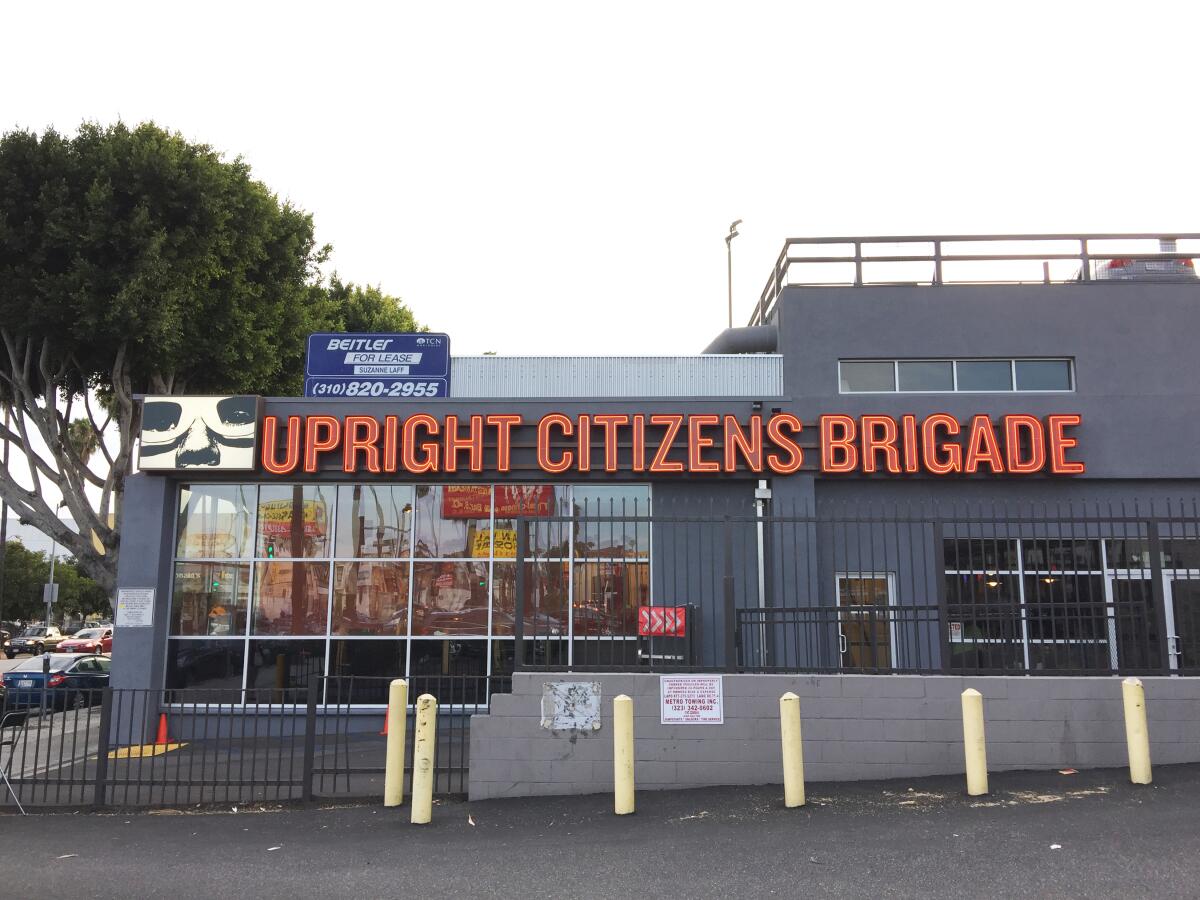
UCB often puts up four to five shows a night, seven nights a week, totaling more than 100 shows a month. In the handful of months that they reopened in Franklin Village, they’ve paid more than 750 performers. Still, note that any given show could have anywhere from two to 50 performers, considering that UCB hosts everything from solo shows to large-scale sketch shows, which means pay could range from $6 to $50 per performer depending on ticket sales.
“The goal here is that the theater does not lose money and that will always be the only goal for the theater,” Bullen says. “There’s no way that you’re going to make money on this theater. It’s just impossible.” There are other plans in store to make this new UCB operation sustainable, but the new focus is being as inviting as possible (UCB has year-round open submissions for shows and performers now).
In contrast, the struggle remains mostly the same for stand-up comedy in L.A. as it was before the pandemic. Many comedians doing a seven to 10-minute spot at the Lab at Hollywood Improv in 2019 typically earned $10 per show. According to Emmy Award-winning comedian Sara Schaefer, that rate hasn’t changed for 2023. Schaefer, who has worked in almost every facet of comedy from “Late Night With Jimmy Fallon” to “Nikki & Sara Live” to writing for several awards shows and doing her own stand-up and solo shows, says local and independent comedy shows give better box-office revenue splits with comedians.
It’s not uncommon these days to get $20 for a spot at a well-respected weekly bar or indie stand-up show in L.A. In pre-pandemic times, Paid Regulars at the Comedy Store would relish playing a Main Room spot on the weekend and splitting the door ticket sales with just the other comics on the line-up, though a good majority of those spots often went to the most famous and richest comedians that perform at the Store. These days, the Store is regularly selling out shows in all three of its rooms, though it’s unclear as to what their split with the performers is.
Canadian transplant Cara Connors, has started to make inroads touring full time as a stand-up and interprets making a living as not having “to have a s— office job and can technically scrape together enough coins each month to live at the starving artist level.” She puts countless hours into promotion of her shows and her newly released album “Straight for Pay.”
As a queer comedian, she searches for local queer groups to see if they would have interest booking her to perform. .
Promoters and publicists make a living off of doing that for many more famous comedians who can afford to pay for such help. Having to hustle endlessly and also supplement her income with commercial and voiceover work, it leaves limited time to fail, experiment and “let your body out of fight-or-flight mode and enter a space where you can be truly creative,” she says.
Further along that path is John Hastings, who does make a living by performing stand-up comedy on the road all around the world. “I go all over the goddamn place telling jokes from Key West to a key party in Key West,” he said. Hastings made headway by advancing through a few rounds of a recent season of “America’s Got Talent,” a credit that does help quite a bit when playing outside of L.A. and New York. Still, he says he’s constantly balancing several gigs to keep his dream alive. For now, he aims to “keep expenses as low as possible and have cheap as f— tastes, so I feel alright.”
Within the comedy business, there is an entire scaffolding of production, administration, writing, etc. that affords some lucky, resourceful comedians a day job that is adjacent to being a comedic performer. Gena B. Jones is almost five years into stand-up and makes around $150 a month on stage. However, she makes a “real salary” as the booking assistant at the Hollywood Improv, one of Hollywood’s big three comedy clubs, placing her in the sphere that she wants to be in and slightly relieving the need to switch gears from the usual service industry jobs comedians often have to take on to making strangers laugh.
Stand-ups strike back
Stand-up Jay Light has industriously worked his way up the ladder in L.A. comedy earning a credit on the televised, Comedy Central version of “Roast Battle,” but he says he currently only earns $7K to $10K annually doing comedy. Yet stand-up helped him get gigs writing for reality competition shows including “MasterChef,” “MasterChef Junior,” and “Domino Masters.”
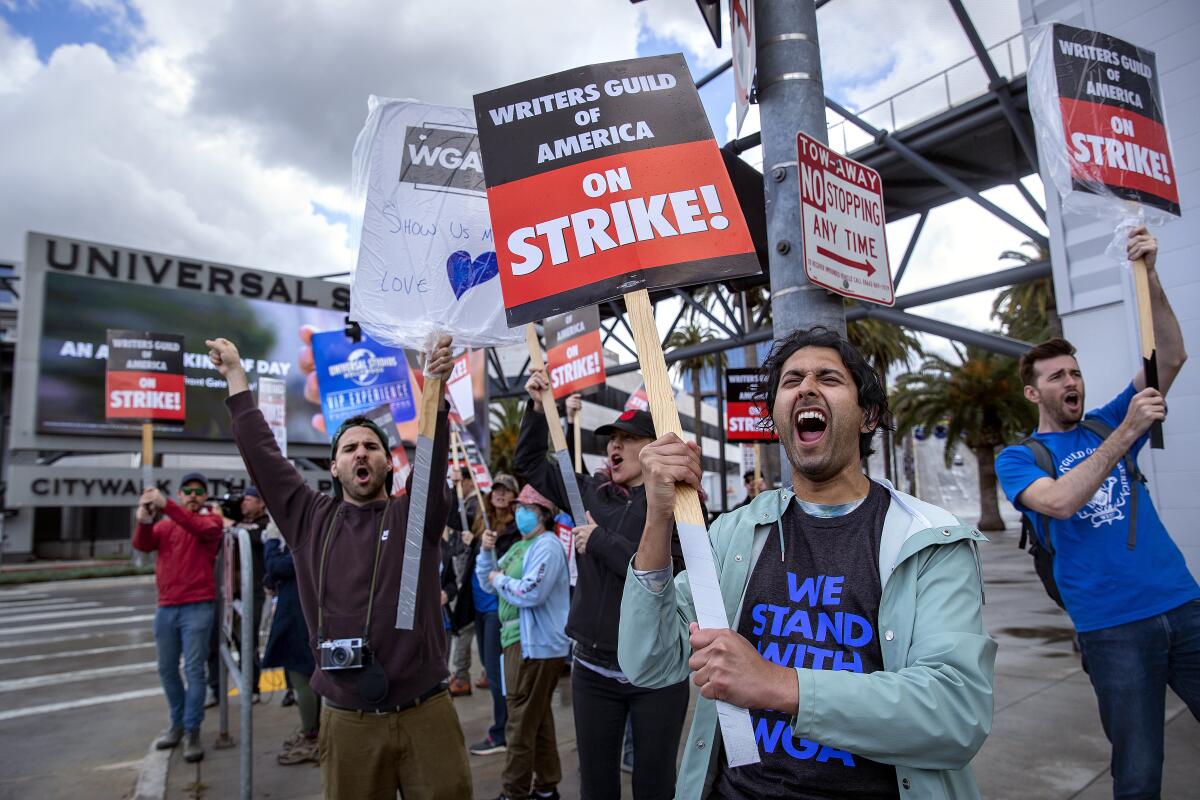
“Weirdly enough [the writers’ strike] hasn’t affected me financially,” he says. “The shows I work for these days are nonunion. From what I have come to understand, reality productions tend to be union for every area of the crew except the PAs and the producers, which comes with its own set of problems.” However, he believes that the WGA will emerge from the strike coming out on top, which will have a positive ripple effect on the entire industry. “The solidarity I’ve seen so far is incredible and it’s great to know that we’re all ready to fight against the studios and streamers that are screwing us over, and making it harder for everyone to create great film and TV.”
The WGA strike is having a similar effect on comedian and TV writer Alex Fernie. “[The strike is] probably affecting me way less than a lot of people I know. I wasn’t in a room or actively working on something when the strike was called,” he said. “It basically affected me in smaller ways, a pilot I worked on that was being shopped around is on hold.”
While there are plenty of comedians who have to scramble to keep their heads above water, there are also a healthy handful of success stories. Last year, Dylan Adler made itonto a few high-profile comedians-to-watch lists on top of being one of the most sought-out comedians in NYC. From there, he got hired to write for the final months of “The Late Late Show with James Corden” and is making the next big steps in his career, a far cry from having to “teach piano, accompany shows and walk dogs,” he said.
Adler didn’t want to share what he gets paid as a staff writer before the writers’ strike, but WGA staff writer minimums ranged from $3,964 to$5,069 a week depending on how much work you’re guaranteed. “It’s truly more money than I’ve ever made before in comedy and also more than any previous job I’ve had,” Adler said. His stint on “The Late Late Show” came to a close with the entire show itself, which concluded days before the WGA went on strike. That allowed for Adler to avoid work stoppage, but the search for a new gig has been stopped cold. “So the strike has for sure affected my work in looking for new writing jobs, going on meetings, development stuff, and auditioning,” he says.
Yes, comics can actually make decent money
L.A.-based comedians Morgan Jay and Mike Falzone have laboriously perfected their acts and shows and shrewdly ran with opportunities to make a very good living performing comedy. Jay, known for his unique crooner-style crowd work, has netted $40k to $80k performing at colleges, clubs, private events and virtual events.” Those numbers follow a hard decade of performing in obscurity paired with the stereotypical grab bag of gig-economy jobs from TaskRabbit, Lyft, Uber and more.
During the pandemic, Jay took advantage of reframing his comedy for virtual events that were the only opportunities available, when many of his peers were refusing to adapt and instead wait; “I had about four different middlemen booking me for different virtual events around the world,” he said. “I think in 2021, I grossed about $50k just from virtual events, and while they have diminished I still do virtual gigs at least once a month now.” The comedian stresses how much sacrifice he had to put in to get where he is at now. “There’s no shame in graduating with that communications degree and working a normal job, saving money so you can pursue comedy full time for a little bit.”
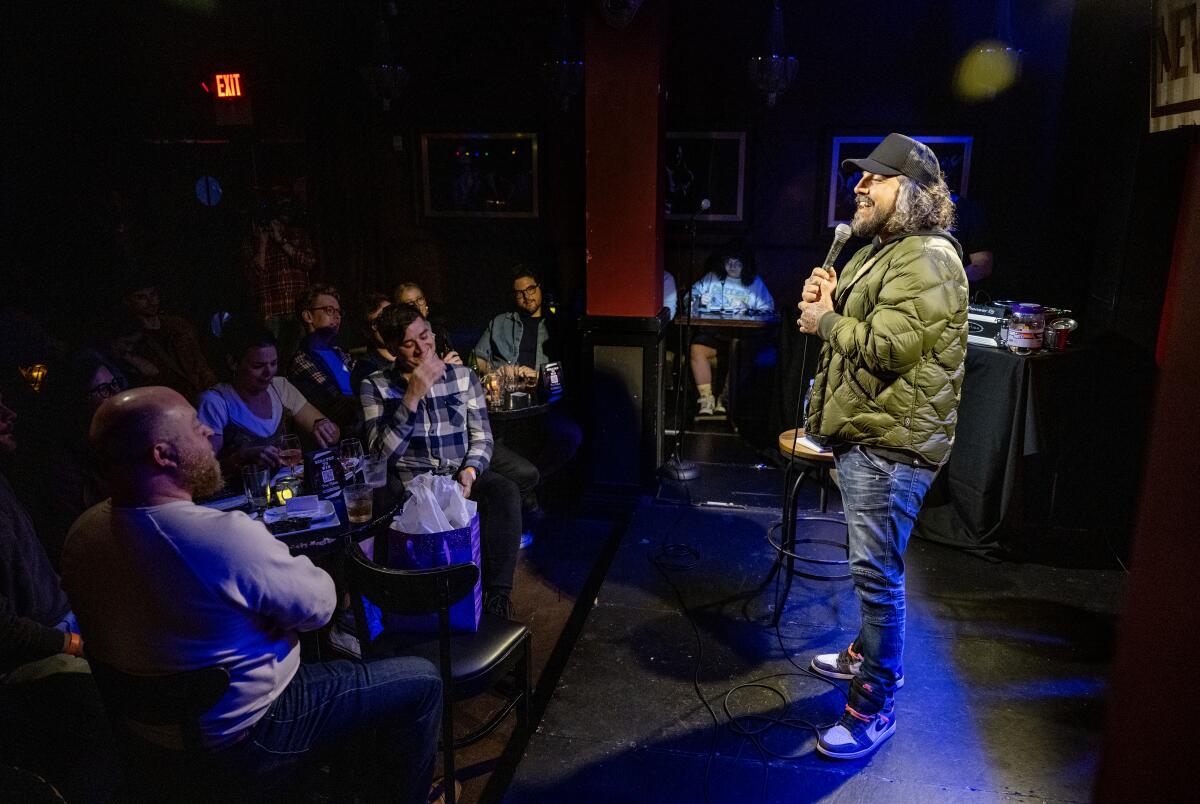
Between touring, merch, YouTube ad revenue, TikTok ad split, Instagram and Facebook ad split, cameo, acting, podcasts and selling a show with Just For Laughs last year, Falzone’s net income crosses the six-figure threshold, but is down to five figures after taxes and expenses. Falzone wears a lot of hats and does photography and design to clear that financial bar, but it’s all in comedy and, very often, involves him just telling jokes. He is very active on social media and has amassed a following that allows him to organically grow his in-the-round, crowd work show “Surrounded” at the Hollywood Improv, which is about to move into the venue’s Main Room (after being a monthly fixture in the smaller Improv Lab).
With his comedy career firing on all cylinders, he has other challenges that he gets to worry about. “Sometimes I’m so busy that living enough life to have experiences and perspective on those experiences becomes a big challenge. Sometimes I feel I’ll get lost and forgotten if I take enough time away from making stuff to simply live life for a while — even though that might not be realistic.”
Despite the hurdles, comedians continue to negotiate their inalienable need to do stand-up to the point that money comes as a secondary concern. “Comedy is my life and there is nothing else I want to be doing or will ever do,” Hastings muses. “Most comedians I know feel the same. It’s a sickness and a calling.”
More to Read
The biggest entertainment stories
Get our big stories about Hollywood, film, television, music, arts, culture and more right in your inbox as soon as they publish.
You may occasionally receive promotional content from the Los Angeles Times.
